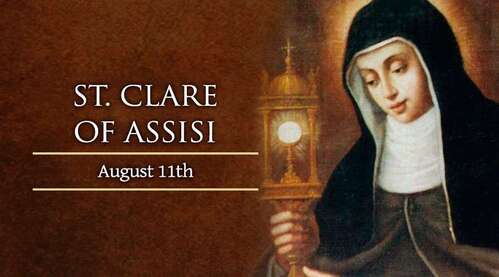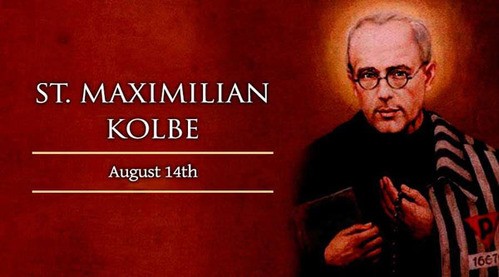this week's feasts
St. Clare

St. Clare was the first woman to join St. Francis and his brothers in the new community of Franciscans. A teenager when she first heard Francis preaching in the streets of Assisi, she was instantly attracted to the spirituality and way of life of the new order. Clare was from a well-to-do family of Assisi, as were most of the first Franciscans, and her father was adamant that his beautiful daughter was not going to follow this religious fanatic, this nut, who was disturbing so many of the families of Assisi.
When she came of age, she ran away to join Francis and his brothers. Francis accepted her as a member of the community and then took her to a Benedictine convent in a nearby town, as it would have been inappropriate for her to live with him and the brothers. Eventually, other women came to join with Clare (including her two sisters, after the death of her parents). A convent was built for them next to the Church of San Damiano where the Crucifix first spoke to Francis. That convent of Poor Clares, as they are known, still operates in Assisi.
This Monday, Aug. 11, is the Feast of St. Clare of Assisi.
When she came of age, she ran away to join Francis and his brothers. Francis accepted her as a member of the community and then took her to a Benedictine convent in a nearby town, as it would have been inappropriate for her to live with him and the brothers. Eventually, other women came to join with Clare (including her two sisters, after the death of her parents). A convent was built for them next to the Church of San Damiano where the Crucifix first spoke to Francis. That convent of Poor Clares, as they are known, still operates in Assisi.
This Monday, Aug. 11, is the Feast of St. Clare of Assisi.
St. Maximillian Kolbe
St. Maximillian Kolbe was a Franciscan friar from Poland. He founded a few monasteries, including one in Nagasaki, Japan. Maximillian had a great devotion to the Immaculate Heart of Mary and founded a religious association known as the Knights of Mary Immaculate.
Eventually, Kolbe was arrested by the Nazis and sent to Auschwitz. One of the prisoners there escaped, and the camp guards decided to make an example of him. They rounded up 10 prisoners who were to be starved to death. One of them, a man named Franciszek Gajowniczek, fell to his knees when his execution was declared, and cried out, “My wife and my children. What will happen to them?” Maximillian, who was standing there, although he had not been named for death, stepped forward and asked to be executed in the place of the man. The guards agreed to this.
Maximillian and the other condemned men were placed in an underground bunker. After two weeks, only Maximillian and three other prisoners were still alive. The guards wanted the bunker to be emptied, so they injected them with carbolic acid. He was cremated on Aug. 15, the Feast of the Assumption of Mary. Hence, his feast day is Aug. 14.
On Oct. 10, 1982, Pope John Paul II declared Kolbe to be a saint, a martyr of charity. A special guest at the canonization was Franciszek Gajowniczek, the man whose life was saved by Maximillian Kolbe.
Eventually, Kolbe was arrested by the Nazis and sent to Auschwitz. One of the prisoners there escaped, and the camp guards decided to make an example of him. They rounded up 10 prisoners who were to be starved to death. One of them, a man named Franciszek Gajowniczek, fell to his knees when his execution was declared, and cried out, “My wife and my children. What will happen to them?” Maximillian, who was standing there, although he had not been named for death, stepped forward and asked to be executed in the place of the man. The guards agreed to this.
Maximillian and the other condemned men were placed in an underground bunker. After two weeks, only Maximillian and three other prisoners were still alive. The guards wanted the bunker to be emptied, so they injected them with carbolic acid. He was cremated on Aug. 15, the Feast of the Assumption of Mary. Hence, his feast day is Aug. 14.
On Oct. 10, 1982, Pope John Paul II declared Kolbe to be a saint, a martyr of charity. A special guest at the canonization was Franciszek Gajowniczek, the man whose life was saved by Maximillian Kolbe.
